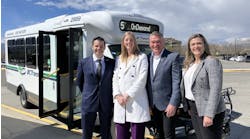U.S. Reps. Steve LaTourette (R-OH) and Russ Carnahan (D-MO) have introduced legislation that would permit public transit agencies more flexibility in how they spend federal funds during tough economic times.
LaTourette said transit agencies like RTA and Laketran are working to serve their ridership and face obstacles like unpredictable fuel prices, route reductions and fare increases. Last year, more than 10 billion trips were made on public transit across the nation.
The Local Flexibility for Transit Assistance Act, H.R.3200, will allow public transit agencies to use some of their federal transit funding for operating expenses. Under current law, if a transit agency is located in an area with a population above 200,000, it may not use federal funds for operating assistance.
"Americans are tightening their belts to make their household budgets work in a tough economy, but the federal government won't let some transit agencies use funds as needed to get them through these rough, unpredictable times," LaTourette said. "What's the point in having a fleet of buses if you can't fill up the tanks? A rigid firewall for federal operating assistance may work with a booming economy with low unemployment, but flexibility is called for in times of economic crisis."
H.R. 3200 includes this language in its findings: "According to the American Public Transportation Association, over the past 2 years, 84 percent of transit systems have raised fares, cut service, or are considering either of these measures in the near future. Additionally, over the same period of time, transit systems across the country have seen a 56-percent reduction in rush hour service, a 62-percent reduction in off-peak service, and a 40-percent reduction in geographic coverage leaving thousands of transit drivers without a job."
LaTourette said the bill also provides increased flexibility for smaller transit systems in urban areas with over 200,000 people that operate less than 100 buses. The bill does not create a new revenue stream for transit agencies and has no cost, he said.
The bill, with nearly110 co-sponsors, is supported by the following organizations: Transportation for America; Amalgamated Transportation Union; Transportation Trades Department, AFL-CIO; The Community Transportation Association of America; Reconnecting America; The Transportation Equity Network; The Gamaliel Foundation; and Public Advocates, Inc.


